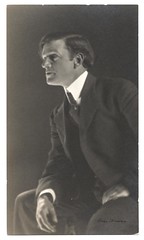For many years, I have said that I’m a gay man trapped in a woman’s body.  This semester I feel like I’m being beckoned to jump on my fashion soapbox.  I have noticed an ongoing problem in the courtroom: people wearing suits that are too small.  I’ve seen this problem across the board, from law  students to judges, in men and women equally.  At first I thought it was just me, until I shared my observations with two judges.  They both responded with an astounding, “Yes!”

- Image by Smithsonian Institution via Flickr
A person that dresses according to the needs of the body that they have, as opposed to the body that they wish they had or used to have, they exude a stronger sense of confidence.  When a person is presenting their case in court, they need to appear strong, solid, and trustworthy.  If the person cannot see and accept the truth about their own size, how can they be trusted to speak the  truth about the case at hand?
Tim Gunn said it best when he said that you should consider, “silhouette, proportion, and fit” when selecting your clothes.  Some clothes are little more forgiving.  For example, jeans – if they are  touch to snug when you first put them on, they’ll loosen in up a few hours.  A suit, however, has no give.  If you think it’s too tight, it’s too tight.
Most people who are wearing the wrong size suit, are only off by one size, like a woman who is a size 8 and squeezes herself into a size 6. Â I want to share some of the visual give aways that you’re wearing the wrong size suit. Â I have seen all of these fashion problems in the law school or at the court this semester.
Let’s start with the jacket. Â The shoulder seams should sit on the end of the shoulder. Â The arms should fit comfortably in the sleeves. Â If the upper arm is too tight, there will be bunching, which gives you the “sausage arm” look. Â Buttoning the jacket should not take an effort or require you to suck in your stomach. Â You never want the judge to be afraid that a button might fly off your suit and hit her in the face.
Like the jacket, there should not be any bunching in the pants or skirt. Â When a man’s pants are too tight, he risks having bunching in the crotch area. Â Women are likely to have bunching through the thighs if they’re wearing pants and in the midsection if they’re wearing skirts. Â The length of the skirt should also be such that you don’t have to pull on your hem when you stand up.
Beyond wearing the proper size suit, I support people using fashion to display their personality. Â When deviating from the norm in a formal business environment, such a court room, it must be done impeccably. Â One of my classmates walked into his final mock trial today rocking a pair of suspenders and a fedora with his suit. Â He looked fantastic! Â Other fashion signature pieces could be a bow tie, a necktie on a woman, cuff links, a paisley pocket square, a brooch, or an untraditional hairstyle. Â Just be sure that what you’re wearing does not distract the court or detract from your message.
Related articles
- Tim Gunn: How to Dress for Different Body Issues (marieclaire.com)
- The Ten Greatest Crimes Against Fashion: Watch What You Wear (socyberty.com)
- Tim Gunn’s Tips for Appropriate Dress (marieclaire.com)
- Fall 2010: Fashions go classic this season, but with contemporary attitude (commercialappeal.com)
- What to Wear to an Interview [TNW Lifehacks] (thenextweb.com)




